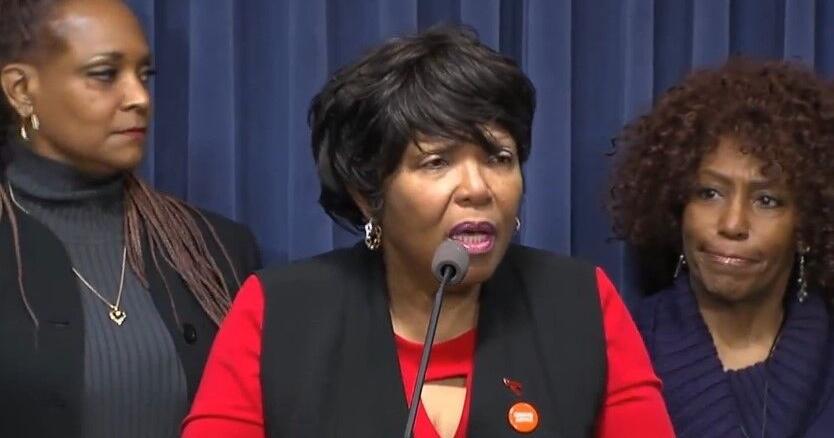
Why are three times as many Black women in Southern Illinois more likely to experience a pregnancy-related death than White or Hispanic women?
Why do Black women also have the highest severe maternal morbidity (SMM) rate compared to White, Asian, or Hispanic women?
Why do Black babies born to Black women die at rates more than double that of infants white, Hispanic, or Asian women in Illinois?
The answer? Racism.
That was one of the findings from an Illinois state health report late last year that pinpointed “racism” as a public health crisis while also noting the state needed to drastically improve in the areas of “maternal and infant health, mental health and substance use disorders.”
The State Health Improvement Plan (SHIP) is part of “Healthy Illinois 2028”- a five-year plan outlining major public health crises the state hopes to address in four years. The plan outlines goals, objectives, and recommends strategies to improve the health of Illinois residents and advance health equity in general. After two years of assessment and planning, SHIP prioritized five major public health issues:
-
Racism as a public health crisis
-
Maternal and infant health
-
Mental health and substance use disorders
-
Chronic disease
-
COVID-19 and emerging diseases
The report emphasized: “There is an overwhelming volume of evidence highlighting how systemic racism throughout the health care system negatively impacts maternal morbidity and mortality for women of color.”
Data from another 2022 report, “The Illinois Task Force on Infant and Maternal Mortality Among African Americans,” stated that Black women in Illinois “are about three times as likely to experience a pregnancy-related death as White and Hispanic women.
Additionally,Black women have “the highest severe maternal morbidity (SMM) rate” at more than two times that of non-Hispanic white women and “significantly higher than Asian and Hispanic women.” For infants – those born to non-Hispanic Black women — the report states they die at “rates more than double that of infants born to White, Hispanic, or Asian women in Illinois,’’ according to the health report.
The health improvement plan, for the first time, made a point of listing “racism” as an overarching public health crisis in Illinois.
“It is essential to emphasize that disparities in health outcomes according to race/ethnicity have nothing to do with biology and everything to do with inequitable distributions of money, power and resources,” the plan stated.
Illinois Public Health Institute (IPHI) senior program manager, Janece Gough added: “Racism is both a cross-cutting issue and a standalone priority because it is at the root of many, if not all health issues.”
In a commentary published here last week, Bethany Johnson-Javois, pastorof Monument of Faith Church in Jennings and President & CEO of the Deaconess Foundation spoke to the dire health disparities in Illinois and Missouri.
Deaconess is dedicated to improving the health of people living in Eastern Missouri and Southern Illinois-which includes Alton, Centralia, Collinsville, Edwardsville, Glen Carbon, Godfrey, Granite City, O’Fallon, and Carbondale.
After reviewing several health studies on pregnancy-related deaths in Missouri Johnson-Javois stated that “84% were determined to be PREVENTABLE.” Citing data from the Illinois “Maternal and Mortality Report,” she noted that of “the 263 people who died while pregnant or within one year of giving birth from 2018 to 2020, 91% of pregnancy-related deaths might have been PREVENTABLE.”
Johnson-Javois said there is a serious “lack of health data on the maternal health inequities in Southern Illinois compared to Missouri.
“Without this accountability and transparency, she said, “skewed data will continue to paint an incomplete picture of maternal and infant health in Illinois.
“In Southern Illinois,I desire my community to receive even more activation and transparency around the issues that surround maternal and infant health that squander the potential of generations of its people,” Johnson-Javois wrote in her commentary.
During an open hearing on the SHIP plan last year, Creola Hampton, president of the Black Leadership Advocacy Coalition for Healthcare Equity, or BLACHE (pronounced “black”) a network of organizations from Chicago to East St. Louis, spoke to the need to address inadequate funding to combat racism in maternal morbidity.
“The unfortunate dilemma is the Illinois Department of Public Health funding is so highly racially inequitable that it perpetuates racism being a public health issue,” Hampton toldCapitol News Illinois, a nonprofit, nonpartisan news service.
Hampton further stressed: “If the state is going to be leading saying that racism is a public health issue, then, the state has to be actively involved and making sure that there is equitable funding going to African American-led organizations to do the work that needs to be done to negate the inequity of health.”
IPHI director Laurie Call said that eight Illinois entities including the Chicago Department of Public Health, the Peoria City/County Health Department, and a Champaign school board, have already issued a formal declaration of racism as a public health crisis. According to the American Public Health Association, 19 other states have also declared racism a public health crisis, including Michigan and Wisconsin.
SHIP’s “Healthy Illinois 2028” plan includes the following recommendations aimed at addressing disproportionate pregnancy-related deaths among Black and Hispanic women:
-
Improve accessibility, availability, and quality of equitable reproductive health and well-woman/person preventative health care services across the reproductive lifespan.
-
Promote a comprehensive, cohesive, and equitable system of care and support services for all birthing persons to have a healthy pregnancy, labor and delivery, and through the first year postpartum.
-
Promote a comprehensive, cohesive, and equitable system of care and services to improve birth outcomes and support infants’ healthy development in their first year.
The plan states that it will be “updated and refined as Illinois begins implementation.” Its success, according to the document, “is dependent on all health partners-navigating and implementing the goals, objectives, and recommended strategies to achieve better health outcomes for all (Illinois) residents.”
Sylvester Brown Jr. is the Deaconess Foundation Community Advocacy Fellow


